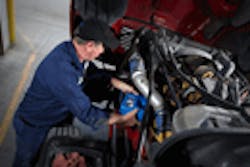New motor oil category could help meet mpg rules
Diesel engine makers and truck OEMs will, within a few short years, expect motor oil to contribute to the mandated greenhouse-gas emissions (GHG) reduction and corresponding increase in miles per gallon performance for commercial vehicles set out in new federal rules that will start taking effect in 2014.
That’s why engine makers have already petitioned for a new API oil-service category to be in place by the time the new federal GHG/mpg rules go fully into effect. Those rules will start to kick in just three years from now. Under the rules, buses and medium- and heavy-duty trucks as well as pickups and vans will be required to meet federally mandated fuel efficiency levels designed to reduce the amount of GHG emissions they produce.
Developed jointly by the Dept. of Transportation (DOT) and Environmental Protection Agency (EPA) along with input from the trucking industry, environmental groups, and state governments – especially California – the standards will go into effect in stages from 2014 to 2018 and impose different fuel-efficiency targets based on the size and weight of given vehicle types.
Although it is yet far from certain, it appears very possible a new American Petroleum Institute (API) oil-service category—one that would supplant the current CJ-4 category— will be developed and put in place to address changes that likely will be made to medium- and heavy-duty diesel engines by the time the GHG/mpg rules kick in.
“The industry is currently working its way through the API [oil-classification] process outlined in API 1509 with regards to evaluating the need to develop a new API service category to address the GHG/mpg regulations that have recently been put in place,” Jeff Torkelson, Ph.D., technical manager—commercial & industrial lubricants, Valvoline New Product Development Labs, told Fleet Owner.
“The group working on this is called the New Category Evaluation Team, or NCET, and is made up of representatives from the Engine Manufacturers Assn. (EMA), API and the American Chemistry Council (ACC),” he continued. “Their recommendation will be taken forward to the Diesel Engine Oil Advisory Panel [of the American Society of Testing & Materials (ASTM)] and ultimately the API. The formation of NCET is the first step in the process of developing a new category. EMA has asked for a new category of engine oil—now known as PC-11 [for Proposed Category 11]—to be available for first license on Jan 1, 2016.”
Heading up the API’s PC-11 NCET is Dan Arcy, OEM technical manager for Shell Lubricants. He told Fleet Owner that the team consists of three member representatives each from API, EMA and oil additive suppliers as well as representatives from industry testing labs.
Each time an NCET is formed, he said its charter is “to look at all information being presented by engine makers to see how developing and releasing a new API category would affect the marketplace, other existing API categories, and the environment.
“The team must also consider the timing of the request, whether or not there are tests available [to prove it out] and is there sufficient data to support changes in engine design,” Arcy continues. When its work is done, the team makes a recommendation to the ASTM oil panel on whether to proceed with a new category or not.
He adds that the team’s recommendation can be a definite “Yes” by consensus or it could be a “No,” but with reasons cited for the denial. At this point in time, Arcy noted, it is too soon to know when a decision will be reached, but “hopefully as soon as possible—but there are many stakeholders who have commented on this and the team must take it all into account.”
Basically, according to Arcy, it falls to the engine makers “to show whether they are unhappy with existing oils or that something will be changing about the engines that will need to be addressed” by lubricant formulations that adhere to a new oil-service category.
Valvoline’s Torkelson said that along with the impact of the GHG/mpg rules on motor oil, “PC-11 oil will also address concerns that have been raised by EMA. These mainly have to do with newer engine designs already introduced or expected to be introduced into the market in the near future.
“The main parameters that the EMA is concerned with—and is currently under discussion in the industry groups for addition to the proposed category—is a more robust oxidation test, a more representative shear stability test, a better aeration test, and a test that incorporates a biodiesel compatibility aspect,” Torkelson added
Not every major oil supplier agrees to the blanket assessment held by several formulators that future diesel motor oils will have to be of low-viscosity formulation to ensure the highest mpg performance possible. However, lower-viscosity oil appears to be on the table as the possibility of launching API Proposed Category 11 is being investigated.
“We feel that an extensive industry-wide education program with active participation from the members of the EMA, API and the ACC will be necessary to overcome likely misgivings from fleets and operators that will have a hard time accepting non-traditional heavy-duty viscosity grades such as 5W-30,” pointed out Torkelson. “The team set up to develop the new API category of oil will ensure that the testing necessary for PC-11 oils is robust—and the group will focus heavily on durability for any lower-viscosity grade oils.”
